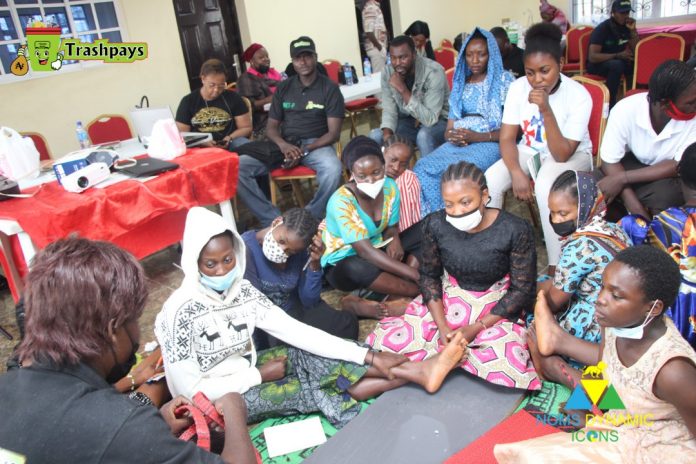Digitalizing Nigeria’s Waste to Wealth
By Zeenat O. Sambo
TECHDIGEST – Over the years, the global application of technological tools for entrepreneurship engagement in waste management has been gaining momentum, thus becoming a top agenda item.
The recent invitation of Trashpays Services, a Nigerian waste management services startup, to the eleventh session of the World Urban Forum (WUF 11) taking place in Katowice, Poland between 26th and 30th June 2022 aimed at discussing inclusive, safe, resilient, and sustainable urban future has re-emphasized the need for more awareness of driving the use of technology to achieve waste management in Nigeria.
Trashpays Services has earned commendations for its immense support and contribution in training and organizing workshops on waste to wealth entrepreneurship programmes, and teaching women on ways of recycling waste matters into profitable resources.
READ ALSO: Trashpays:Transforming Waste into Economic
Thus, the use of Information Technology as a tool in converting waste to wealth entrepreneurship goals has become a great initiative that the federal government and stakeholders need to integrate more households, businesses, and industries into the system.
E-waste also referred to as digital rubbish, is unwanted electronic products or any electronic equipment that has been discarded. On the other hand, those unwanted products discarded by society are called solid waste, thus requiring a proper disposition and management.
According to the United Nations, the quantity of e-waste has increased from 20 to 50 million tonnes per year since 2000. The report forecasted that the numbers will more than double by 2050 to reach a staggering 111 million tonnes per year.
In Nigeria, about 1.1 million n of e-waste is generated annually. As a result of the inability to manage such items, 75 percent of it is laying verge thereby causing hazards.
E-waste management in Nigeria includes waste collection, separation, transfer, treatment, recycling, and final disposal, as well as public information campaigns and awareness training which is facilitated by the Extended Producer Responsibility (EPR) scheme.
With EPR, producers assume significant financial and/or physical responsibility for the treatment or disposal of post-consumer products. To ensure that the EPR scheme remains resilient, manufacturers, assemblers, importers, and distributors contribute to the non-profit E-waste Producer Responsibility Organisation of Nigeria, to ensure shared responsibility and funding for e-waste processing and recycling.
Nowadays, technology is transforming waste management in many ways. With this, waste is being turned into energy, precious metals are being recycled, route efficiency is being improved, and new collection and disposal technologies are being developed to meet up with the huge waste materials that need recycling.
Electronic and solid waste causes significant pollution and environmental degradation when improperly handled and disposed of. However, they still have numerous benefits when properly managed and recycled into valuable substances, and raw materials, as well as creating opportunities for economic growth.
Among the innovative technologies used in waste management are smart waste bins, waste level sensors, AI recycling/waste sorting robots, garbage truck weighing mechanisms, solar-powered trash compactors, and modern landfills powered by eco-friendly, sustainable technology.
For instance, Fascinate Technologies a startup that introduced the smart waste bin in Nigeria ensures effective waste collection that helps to minimize improper waste disposal, prevent environmental pollution, and the spread of diseases, and promote a greener and more eco-friendly environment.
Meanwhile, smart waste bins are designed to automatically sort recyclables into separate compartments using artificial intelligence. This process helps recycling companies to be able to filter waste and refine it into new goods for consumption and reuse.
The installation of waste level sensors in public bins and dumpsters of all sizes helps prevent overflowing and littering of the surrounding environment. This makes it easy for waste collectors to collect materials for refuse instead of ending up in landmines thereby causing land and water pollution.
It is important to note that recycling more waste reduces waste generation, regardless of its type. As landfills are reduced, more land can be used for agricultural purposes where teeming youth can cultivate and harvest, thus reducing the unemployment rate.
With this development, it is easy to integrate unemployed youths living in rural and major cities into recycling initiatives. When these waste management projects are carefully and properly organized, they will serve as sources of livelihood for unskilled workers.
Again, since recycling allows valuable materials to be recovered, reused, and protects earth’s resources, this, in turn, provides enormous opportunities for innovation and creativity in business models for sustainable solutions.
It is worrisome to learn that youth’s engagement in recycling waste has been undervalued by many because of the dirty image associated with waste reuse. But unknowing to many, the recovery of valuable materials from waste is enough for further investment when properly handled.
Due to technological advancement, polythene bags, polyethylene terephthalate (PET), bottles, and even paper can be recycled by companies that recycle plastic waste into semi-processed raw materials for plastic manufacturers and low-density polyethylene (LDPE) and high-density polyethylene (HDPE) into plastic resins or pellets.
Therefore, it is vital for the National Information Technology Development Agency (NITDA) to encourage waste management startups/companies, environmental management agencies, and other relevant private and public sector stakeholders to raise awareness and enlighten more youths to harness the endless opportunities that are yet untapped in this sector.
In effect, more waste recycling companies will emerge to convert waste into wealth to achieve a stable economy and improve the well-being of the people.
Zeenat Sambo
Wuye District Abuja
















